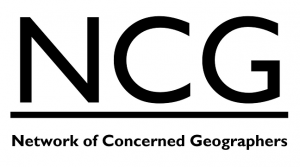Call to Action: Network of Concerned Geographers
Our growing network – the Network of Concerned Geographers – is pressuring the American Association of Geographers to study and take action on the growing engagement of geography with the US military and intelligence communities. This initiative grew out of a series of meetings in Vancouver, where numerous geographers from the University of British Columbia and Simon Fraser University came together to discuss the risks of an increasingly close relationship between the military and the discipline of geography. Working groups emerged from that meeting and the petition came out of those working groups. For more details see here: https://actionnetwork.org/petitions/network-of-concerned-geographers
Please circulate and consider signing:
Jessica Dempsey, Paul Kingsbury, and Joel Wainwright
Paul Kingsbury, Associate Professor, Department of Geography, Simon Fraser University, 8888 University Drive, Burnaby, BC, V5A 1S6, Canada




I would be more concerned if the military (and other cabinet level leaders) were NOT considering the importance of geography in their decision making. In fact, most leaders seem blind to the importance of geography in everything from trade, to climate change and on to environmental stewardship! That blindness may well account for the diminishing number and range of geography courses in high schools across Canada.
This is true. I thought the same at first, but then assumed that they must be referring to the military making liaisons with geographers and in the field of geography.
That is, like with medicine – the military knows medicine but doctors have a different moral code and constitution than the military.
Just think of where geography and remote sensing would be WITHOUT the military? No GPS, no RADAR/InSAR, no satellite imagery, and so on.
Without the nuclear arms program of the 1960’s which had given rise to hardware and mapping applications, GIS would never have been developed.
To address the concerns of NCG:
Safety: US citizens are at-risk anywhere overseas, regardless of their true purpose as they are viewed with suspicion.
Research and labor demand: Companies like DigitalGLobe would not exist if not from the funding of government (military) contracts.
Curriculum: geospatial intelligence analysis has as many non-military applications a sit does military ones.
Academic freedom: Last time I checked, one had the right to refuse to sign a NDA.
Ethics: is a choice and not something that can be forced upon somebody.
Geographers with concerns about the military simply need not apply.